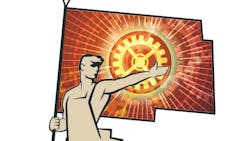The Next Industrial Revolution is Already Here
"I see it as a huge wave that is breaking at the moment and I don't think any of us realize how large it is."
Andrew Moore, dean of the School of Computer Science at Carnegie Mellon University and a former vice president of engineering at Google, is describing for a World Economic Forum meeting in Dalian, China, the industrial revolution in which we are now living. It is a revolution that is being driven by artificial intelligence systems that draw on massive amounts of data.
This revolution can do miraculous things. For example, on the WEF panel were two U.S. manufacturers. They might not describe themselves that way, but they are indeed entrepreneurs creating products with huge potential value.
Katrine Bosley, the CEO of Editas Medicine, in Cambridge, Mass., leads a firm founded in 2013 to use genome editing technology to create therapeutic products. There are more than 5,000 diseases of genetic origin, she said. Taking what were once the dreams of science fiction authors, her company is one of the commercial pioneers developing ways to fix these broken genes.
Massive computer power is helping scientists sequence genes at a pace increasing far faster than Moore's law for semiconductor evolution, noted Bosley. Not only is the cost of gene sequencing plummeting but also the accuracy and speed of the process.
After blood, bone is the second most commonly transplanted human organ, and the only way to get bone is to take it from a body. Nina Tandon, president and CEO of EpiBone, New York, N.Y., uses 3-D imaging and the stem cells from a person to grow bone in a bioreactor. Such a transplant avoids any transplant rejection issues. Tandon said rather than look at the body in a mechanistic way, where replacement parts are sourced, it can be viewed as an ecosystem, one that we can "collaborate with" to create "new regenerative systems."
Speaking of ecosystems, Feike Sijbesma, CEO and chairman of Royal DSM, a life sciences company headquartered in the Netherlands, said current advances in science were helping us "move away from the fossil age we live in to the biorenewable age."
Just because you put 'creative' next to destruction doesn't mean that something isn't being destroyed.—Sir Mark Walport
Sijbesma said it was "unbelievable" how many products were made from three raw materials -- coal, oil and gas. But he looks to a future that moves away from a linear economy to a circular economy where the convergence of biomaterials, IT-enabled connectedness, the personalization of 3-D printing and nanoscale products can address "the most important topics we are struggling with like health and food for everybody, climate change, new energies, poverty."
Coping with such change, though, is an enormous challenge. "Disruptive innovation" and "creative destruction" are common terms used in discussions about digital businesses or green energy debates. They are often used rather bloodlessly to describe what some observers see as progress, but there is another side to this industrial revolution.
"Just because you put 'creative' next to destruction doesn't mean that something isn't being destroyed," pointed out Sir Mark Walport, the chief science adviser for the British government. "These are wonderful euphemisms that cover the fact that revolutions are really quite difficult things."
Consider the disruption in jobs. Manufacturing has seen millions of low-skill jobs disappear from the U.S., never to return. Many see this disruption as indicative of a beneficial evolution toward a knowledge society. But both Walport and CMU's Moore agreed that the same jobs disruption was coming to the white collar world.
"It will be safer to be a plumber than a management consultant," Moore said. He predicted that the profession of doctor will disappear as computers increasingly are used for diagnosis and the prescription of appropriate therapies.
Sijbesma brought up two ideas for a changing world. First, if people are going to work to age 70 or beyond, should they be mandated to go back to school at age 50 for two years in order to gain skills relevant to the current workplace? And second, should governments shift the taxation burden from labor, which makes it expensive to create jobs, to scarce raw materials?
Bosley said the idea of lifelong learning "just goes along with the territory" if you are going to be in an industry like biotech. Or, it seems, any industry rocked by this revolution.
About the Author
Steve Minter
Steve Minter, Executive Editor
Focus: Leadership, Global Economy, Energy
Call: 216-931-9281
Follow on Twitter: @SgMinterIW
An award-winning editor, Executive Editor Steve Minter covers leadership, global economic and trade issues and energy, tackling subject matter ranging from CEO profiles and leadership theories to economic trends and energy policy. As well, he supervises content development for editorial products including the magazine, IndustryWeek.com, research and information products, and conferences.
Before joining the IW staff, Steve was publisher and editorial director of Penton Media’s EHS Today, where he was instrumental in the development of the Champions of Safety and America’s Safest Companies recognition programs.
Steve received his B.A. in English from Oberlin College. He is married and has two adult children.
